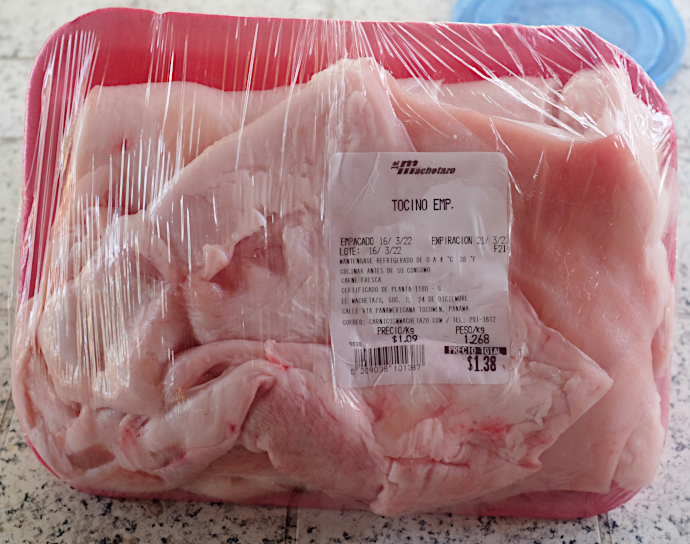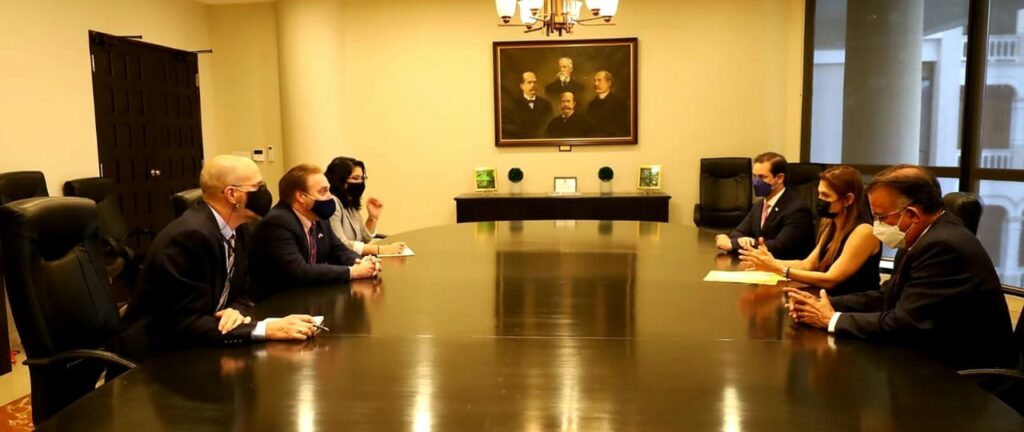Slab bacon — lonja or tocino — is an ever more ubiquitous poverty rations staple for Panamanians and let us argue about whether that’s because foreign producers have been dumping pork bellies here. Cattle rancher Nito Cortizo resigned as agriculture minister during the Martín Torrijos administration over the prospect of Panamanian agriculture being ruined by cheaper US exports. The economic lay of the land is different now, but is he thinking about restarting the Panamanian economy by nurturing and protecting large-scale industrial pig farming? From consumer, health, environmental and social fairness perspectives there may be objections to that strategy — which US pork producers may exploit by sponsoring propaganda campaigns if push comes to shove. Photo by Eric Jackson, shortly before frying some of this and feeding it in a mix with rice, soy protein and achiote to the dogs in his life.
Panama asks Washington for duty renegotiations
on pork, poultry, rice and dairy products
by Eric Jackson
The floating of informal suggestions met a chilly informal US response. In these hard economic times the Biden administration is unlikely to just give away us trade advantages. No, we were told, Washington is not interested in allowing Panama to raise duties on key food staples that Panama imports from the United States.
There is a treaty about that, the United States-Panama Trade Promotion Agreement (TPA), which went into effect in 2012. Most US agricultural exports to Panama became duty-free when it went into effect and exporters of other US farm products saw their Panamanian duties reduced. More than 87 percent of US industrial goods exports to Panama became duty-free, including information technology equipment, agricultural and construction equipment, aircraft and parts, medical and scientific equipment, environmental products, pharmaceuticals, fertilizers, and agro-chemicals. US companies got unrestricted access to bidding on Panamanian government contracts. It was a triumph of neoliberal free trade and deregulation ideology at the time.
The devastation of Panama’s farm sector that Cortizo predicted when the TPA was being negotiated did come to pass. A lot of the benefits that the American negotiators expected didn’t. Yes, you can find peanuts from Jimmy Carter’s home state from time to time in Panama, but Chinese peanuts are cheaper and easier to find. Made-in-the-USA peanut butter? Also available, but the increasing trend is made somewhere else with products grown somewhere else under a US-based brand. The US food exporters still have some advantages when it comes to perishable products.
Talks about these sorts of things can get down to arcane consumer preferences. In the USA, for example, when the TPA was negotiated white Americans’ preferences for chicken breasts, as contrasted with black Americans’ preferences for chicken legs — adding up to net demand for the USA to export muslos con encuentros to Panama and import pechugas con alas from Panama — actually became a diplomatic consideration. Have preferences, or better yet cravings, changed since then? Might the ad agencies fabricate such demands? We don’t live in a simple world.
It’s taken by many politicians on both sides of the US partisan divide that free trade is a settled issue, but support for free trade has declined among the US electorate. The shift is also evident among academic and diplomatic elites.
(Look at how trade questions are posed by US pollsters and discussed by the wonks, and “with China” becomes the sometimes explicit and usually otherwise implicit presumption. “With Latin America” hasn’t received much attention at all. Now, with the sanctions war against Russia and all that is doing to “globalization,” both the system and public perceptions about it may be in for some additional significant changes. The United States, of course, is not the only exporter whose opinions about free trade with Latin America are relevant.)
Thus Panama’s request comes at time when the economic and political conditions of a decade ago have changed and are changing. Thinking among Americans has likely changed a lot more than power relationships within the Beltway. Little Panama, which would not be a life or death matter for any of the US producers involved, could become an outsized symbol.
If Biden agrees to renegotiate a few agricultural tariffs, it’s a reasonably safe bet that on Fox News he will be called a wimp who’s just giving away US advantages. If Biden conditionally agrees to talks — as in ‘Yes, we will talk about those things, but in the process we need to talk about these other things that we want’ — it structurally becomes less about free trade and more about managed trade. Then, both Biden and Cortizo might get off of some of their respective hooks: ‘We’re talking about it, it’s a long and complicated and confidential process, but rest assured progress is being made even if we don’t yet see a result’ sorts of dodges. Sort of like when a city council faces a controversial land use question and some bright-eyed and ambitious council member proposes to do a study about it, then lists that as an accomplishment at the next election time.
Get away from the great power implications and we shall see if Nito Cojs rtizo is about to shift his party’s economic thinking from pure neoliberal cant back to the import substitution policies of the PRD’s founder, General Omar Torrijos. But even within that, there would be the question of whether it’s all about promoting the larger producers of an agribusiness sector, or a more holistic set of questions about employing a too-idle national work force, dealing with economic informality and feeding the Panamanian people. Chicharrones made from Panamanian pork rinds, packaged by established companies and sold in little bags at leading supermarkets could be just a tiny part of the issue.
Delegations led by Foreign Minister Erika Mouynes leading Panama on the right and US chargé d’affaires Stewart Tuttle on the left meet as Mouynes delivers a note addressed to US Agriculture Secretary Thomas Vilsack and US Trade Representative Katherine Tai, asking the US government to reopen certain agricultural tariff issues. Unless there is a strong will on both sides to head into some new directions, it will be a prolonged process. Getting a new treaty through the US Senate seems out of the question, but some waivers could come through with the signatures of two countries’ presidents. They’d each need something positive to show to their respective constituents. Panamanian Ministry of Foreign Relations photo.
Contact us by email at fund4thepanamanews@gmail.com
To fend off hackers, organized trolls and other online vandalism, our website comments feature is switched off. Instead, come to our Facebook page to join in the discussion.
These links are interactive — click on the boxes














